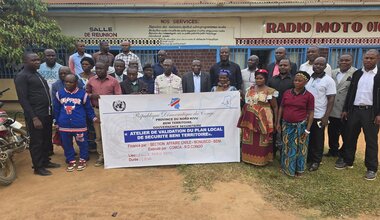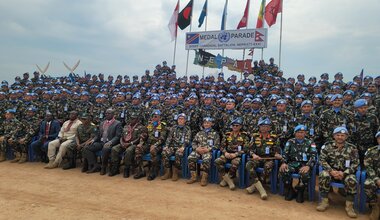International Day of Peace: Young People from Bunia and Fataki Sensitized to Tolerance and Fraternity
It is with students and their teachers that the International Day of Peace observed on September 21 of each year was commemorated this Wednesday in Ituri. In Bunia first, the Bangladeshi blue helmets brought together around fifty students, including 30 girls, and their supervisors at Ndoromo military camp, to raise their awareness of the importance of peace, a behavior that should be nurtured from an early age, at school, in the family. These children thus learned what the war cost the country, how it undermined their future and the development of the province.
MONUSCO North Sector commander in Ituri, General Mushin Alam, urged them to nurture the spirit of tolerance and brotherhood wherever they are and never to resort to violence to resolve what may pit them against each other.
“You are all Iturians and Congolese first, regardless of where you come from or your community origin. Congo is your country, Ituri your province. You are the future of this country and this province; we are here for peace and nothing else, do not get me wrong. With peace, you will be able to go to school without being attacked, travel everywhere safely, start a business without fear…”, he said. To wrap up this activity, a drawing contest was organized during which these children had to represent their own symbols of peace.

On the side of Fataki, 85 km from Bunia, in the territory of Djugu, the Nepalese blue helmets gathered at MONUSCO military base some forty people, including seven women, students, teachers, young leaders, as well as internally displaced persons. It was to sensitize them to coexist peacefully and to strengthen social cohesion between the Hema and Lendu communities living in the Djaiba and Fataki groupings.
Teachers, pedagogues par excellence, have been targeted to "teach" their students love of neighbor, mutual tolerance, acceptance of others, how to address differences and contradiction, without resorting to violence.
Several messages were thus launched by the blue helmets towards the participants and the local communities; in particular the need for everyone to focus on peace and how to put an end to the massacres and killings of civilians that continue in the province; the commitment of young people, women and civil society to support peace efforts by refraining from any behavior likely to inflame social tensions; refusal to join armed groups, etc.
“I am very happy that MONUSCO has organized this activity here at home which brought together all the communities. We dialogued and discussed the root causes of war. It is very good since now we know what we must do at school and the community leaders now also know what they must do", declared Evelyne D'dza Tsesi, director of the CHU primary school in Fataki.
For her, peace is essential for the survival of communities. “If there is peace, our mind will be free and we will move without fear, we will also do farming work without fear. Peace means a lot here at home. IDPs sites are near MONUSCO base, our people don't move beyond this area feely, they hardly get food because of fear and insecurity, children don't have anything to eat, they don't go to school because of insecurity, people are miserable because they don't have access to their farms,” she lamented. She therefore urges MONUSCO and the Congolese government to work harder to accelerate the DDRC-S program and pave the way for the development of Fataki and its surroundings.
The same goes for Stéphane Dhedja, youth representative at the Djaiba IDPs site, for whom the government must do everything, with support from MONUSCO, to restore peace and prevent many young people from continuing to swell the ranks of armed groups. “Because of this war, we have no access to the farms, children do not go to school, we have nothing to eat, old mothers are suffering. We want peace. MONUSCO must do everything to support the government to restore peace in our country, many young people are enrolled in armed groups because of unemployment,” he said. What MONUSCO authorities have fully adhered to.
In an interview with the press in Bunia, Marc Karna Soro, the head of MONUSCO office in Ituri, recalled “MONUSCO is preparing its exit from the country. The government, whether at the national or provincial level, is actively engaged in mobilizing resources for the operationalization of the PDDRC-S”
“We urge those who continue to spread death, resentment, and frustration to stop with these forms of violence…. We continue to do everything in our power to try to help communities find peace,” he further said.
Mr. Soro nevertheless encouraged the communities to get involved in peace-building efforts which cannot be envisaged without their participation. “Some of the instruments of violence come from the community. The armed groups we have in Ituri, for the most part, apart from the ADF, are all armed groups made up of young people from Ituri, from the communities that have always lived here together. It is high time that the communities themselves, together, stand up as one man or one woman and say: enough is enough, so that peace can return and development can take off”, he insisted.
M. Soro a néanmoins encouragé les communautés à s’impliquer dans la construction de cette paix qui ne sera pas faite sans elles. « Une partie des instruments de la violence provient de la communauté. Les groupes armés que nous avons en Ituri, dans leur grande majorité, en dehors des ADF, sont tous des groupes armés constitués de jeunes originaires d’Ituri, originaires des communautés qui ont toujours vécu ici ensemble. Il est grand temps que les communautés elles-mêmes, ensemble, se lèvent comme un seul homme ou une seule femme et qu’elles disent : ça suffit, pour que la paix puisse revenir et que le développement puisse prendre son envol », a-t-il insisté.

 UN
UN United Nations Peacekeeping
United Nations Peacekeeping






